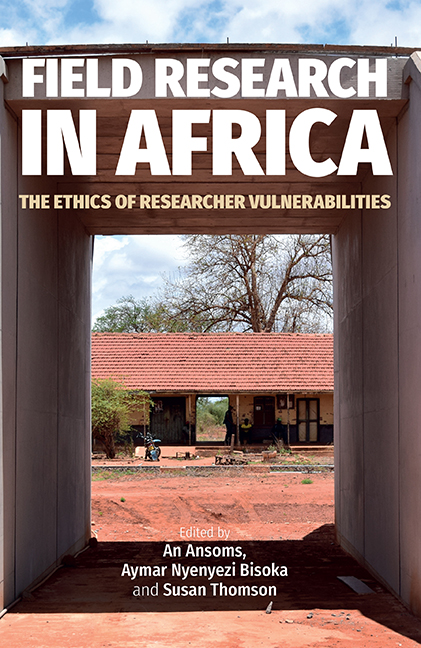Book contents
- Frontmatter
- Contents
- List of Contributors
- Foreword: It is about Us
- Map of Africa showing Fields of Research
- Introduction: Fields of Vision, Emotion as Reflexivity
- 1 Skin Connections: Negotiating Institutional Ethics alongside Insider Identities
- 2 Conducting Sensitive Research ‘At Home’: A Matter of Responsibility
- 3 A Gendered Research Journey: Ethical Dilemmas of an Algerian Immigrant Recovering the Memory of ‘Home'
- 4 Establishing Kinship in the Diaspora: Conducting Research among Fellow Congolese Immigrants of Cape Town
- 5 ‘If they find out, we're dead': Intermediaries, Self-censorship, and Anxiety in Research as an Outsider-Insider
- 6 Looking Behind the Screen: Ethical Quagmires when Accessing Hidden Discourses
- 7 Scholar-Activist? On Relational Accountability and an Ethic of Dissemination
- Conclusion: Theorising Self as Ethical Research Practice
- Bibliography
- Index
Foreword: It is about Us
Published online by Cambridge University Press: 10 June 2021
- Frontmatter
- Contents
- List of Contributors
- Foreword: It is about Us
- Map of Africa showing Fields of Research
- Introduction: Fields of Vision, Emotion as Reflexivity
- 1 Skin Connections: Negotiating Institutional Ethics alongside Insider Identities
- 2 Conducting Sensitive Research ‘At Home’: A Matter of Responsibility
- 3 A Gendered Research Journey: Ethical Dilemmas of an Algerian Immigrant Recovering the Memory of ‘Home'
- 4 Establishing Kinship in the Diaspora: Conducting Research among Fellow Congolese Immigrants of Cape Town
- 5 ‘If they find out, we're dead': Intermediaries, Self-censorship, and Anxiety in Research as an Outsider-Insider
- 6 Looking Behind the Screen: Ethical Quagmires when Accessing Hidden Discourses
- 7 Scholar-Activist? On Relational Accountability and an Ethic of Dissemination
- Conclusion: Theorising Self as Ethical Research Practice
- Bibliography
- Index
Summary
ONE OF THE most appealing things about research is the cosy feeling it gives researchers that they are contributing to knowledge. The feeling is not misplaced. Indeed, research accomplishes a lot. Even if one were to be cynical and point out that not all research contributes to knowledge, it would still be possible to argue that not yet knowing is also knowledge because not knowing and knowing why we do not know is a form of knowledge. This is particularly the case when we carry out research in ‘unfamiliar’ contexts on delicate subjects. An ‘unfamiliar’ research context is not necessarily a culturally distant setting or a setting unknown to the researcher. Rather, it is a context within which researchers deploy the concepts of science in order to render the context intelligible.
Often, though, the impulse to know does not come from those settings. It comes from other scholars who assume that the importance of their work is acknowledged by all. To be sure, research is all about deploying concepts and theories to render the world intelligible. The issue, though, is whether rendering the world intelligible gives researchers an entitlement to know. In other words, knowledge production is not the outcome of a mandate given to researchers by those who are ‘the subjects’ of research, or the settings which are researched upon. The mandate is directly drawn from the commitment of the individual researcher to the very idea of rendering the world intelligible. There is, therefore, a sense in which research as the translation of the right to know is an ethical issue right from the beginning. The researcher claims the right to intrude into settings and people's lives in the service of some higher goal which might not be immediately relevant to the settings and the people about whose life the research will be spilling the beans. Researchers have successfully ignored this issue by appealing to the positivist idea underlying the pursuit of knowledge, namely the commitment to improving human welfare.
The problem with this positivist idea, as we know from the history of science – not least, the history of knowledge production under colonial and neo-colonial conditions – is that such a commitment has also been deployed alongside the goal of effecting changes in the way other people live.
- Type
- Chapter
- Information
- Field Research in AfricaThe Ethics of Researcher Vulnerabilities, pp. ix - xiiPublisher: Boydell & BrewerPrint publication year: 2021



